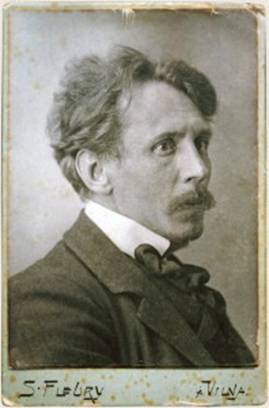
THE VOICE OF INTERNATIONAL LITHUANIA
|
VilNews has its own Google archive! Type a word in the above search box to find any article.
You can also follow us on Facebook. We have two different pages. Click to open and join.
|
Sat, 1st October, 2011 - Posted by - (0) Comment
Lithuanian music on
BBC Radio 3

At last, after many years of campaigning, the British Broadcasting Commission and its classical music channel Radio 3 has realised that classical music exists in Lietuva.
On 22 September 2011, UK based Lithuanian pianist Evelina Puzaitė appeared on BBC Radio 3s programme In Tune in a belated celebration of the 100th anniversary of the death of Čiurlionis. Despite my pleas at the time, Radio 3 ignored the actual anniversary on 10 April, but made amends with the In Tune programme which was broadcast on what would have been Čiurlionis' 135th birthday.
As well as playing six of Čiurlionis' piano pieces, Evelina gave a very professional account of his achievements in the field of music composition, art and literature. The presenter Sean Rafferty, said at the end that the BBC would pay special attention to Čiurlionis in his anniversary year.
Earlier on 16 August, the same programme featured the British Presteigne Music Festival which this year promoted Lithuanian music. As well as interviewing the Artistic Director who explained that it was the first festival of Lithuanian music to be held in Britain, a young British violinist Tamsin Waley-Cohen played Barkauskas' Partita.
Having been a thorn in the side of the BBC since 2003 in my campaigning for Lithuanian music to be played on Radio 3, I immediately emailed a letter of thanks, pointed out that the Čiurlionis anniversary had been ignored, and that Evelina Puzaitė and the Cosima Piano Quintet would be performing at an anniversary concert on 25 September at the Royal Academy of Music in London.
The outcome was an invitation for the performers to appear on In Tune. As I don't personally know Evelina and the other members of the Quintet, I passed the invite on to Daiva Parulskiene, the Cultural Attaché at the Lithuanian Embassy in London, who made the necessary arrangements.
Three days after her In Tune appearance, Evelina Puzaitė played a number of Čiurlionis' piano preludes at the very enjoyable anniversary concert in London. The string players of the Cosima Piano Quintet followed on with a performance of Čiurlionis' String Quartet, and Evelina joined the string players to end the concert with an exciting performance of Robert Schumann's Piano Quintet in C minor op 44.
My next BBC goal is a Radio 3 Composer of the Week series. I first suggested that in 2004 - even gave them a synopsis for the five programmes to be broadcast Monday to Friday (though then the plan was for Lithuanian music including Čiurlionis). Recent correspondence, including loaning the BBC my boxed set of Čiurlionis CDs bought from the Čiurlionis Museum in Kaunas, gives a glimmer of hope, and no doubt the In Tune appearances will help in the cause to get Lithuanian music performed and broadcast in Britain.
What is also needed now is for Lithuanian Radio to send the BBC a steady stream of Lithuanian music to be broadcast on Through the Night and hopefully, during the day as well. I look forward to the day when Lithuanian music is as well-known in Britain as Estonian music now is.
Tony Olsson, Ilfracombe, United Kingdom…
- Bookmark :
- Digg
- del.icio.us
- Stumbleupon
- Redit it
Sun, 7th August, 2011 - Posted by - (1) Comment
Antanas Sileika
Stories from behind
the iron curtain
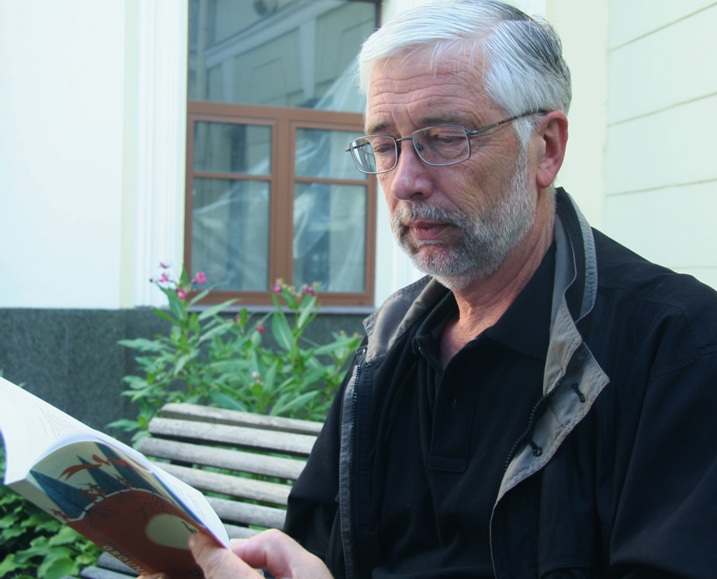
I sit outside and drink coffee with Antanas Sileika this beautiful summer
morning in Vilnius, as he tells me about his latest novel, Underground.
By Aage Myhre
aage.myhre@VilNews.com
I sit outside and drink coffee with Antanas Sileika this beautiful summer morning in Vilnius. The award-winning Canadian-Lithuanian writer is visiting the country his parents fled during the Second World War. He is here to promote his latest book, Underground, which probably also comes in Lithuanian edition this autumn. The novel, which can be bought through Amazon Canada, tells the problematic love story of Luke and Elena, two members of the Lithuanian partisan revolt against the Soviet Union in the middle of the 1940s.
His visit to the fatherland has also another purpose, namely to gather information for his next book, and he tells me that the new novel will have the early 1920's as backdrop, the years when Lithuania just had begun to re-develop the country after more than 100 years of occupation by Tsar Russia.
But this summer morning, we focus on the period after World War II. The below 5-chapter essay speaks for itself…
- Bookmark :
- Digg
- del.icio.us
- Stumbleupon
- Redit it
Sun, 7th August, 2011 - Posted by - (1) Comment
Underground:
A Novel by Antanas Sileika

Book review by DONNA BAILEY NURSE
in Canadian ‘The Globe & Mail’ http://www.theglobeandmail.com
“How are we going to survive unless we turn our hearts to stone?” a comrade warns the hero of Antanas Sileika’s Underground. The question is an example of the elegant thinking that characterizes this rare and compelling chronicle of Lithuanian partisans and their violent struggle against Soviet occupation.
Sileika’s third novel follows the military career of Lukas Petronis, whose bravery and commitment to the cause elevate him to legendary status within the resistance movement. Despite his heroism, Lukas keeps his heart from growing hard by falling in love with Elena, the sister of a partisan.
Underground, by Antanas Sileika,
Thomas Allen, 305 pages, $24.95 Buy from: Amazon.ca Chapters Indigo
- Bookmark :
- Digg
- del.icio.us
- Stumbleupon
- Redit it
Eva Stachniak interviews Antanas Sileika
Sun, 7th August, 2011 - Posted by - (1) Comment

Eva Stachniak is a Canadian and Polish novelist and short story writer. Her new novel "The Winter Palace" based on the life of Catherine the Great will be published in the fall of 2011. Her web site is: http://www.evastachniak.com
By Eva Stachniak
Antanas Sileika, a Canadian novelist and critic, a son of Lithuanian-born parents, is the author of two novels and one collection of linked short stories Buying on Time (nominated for both the City of Toronto Book Award and the Stephen Leacock Award for Humour). Underground, his newest novel, was published in March of 2011 by Thomas Allen. In the words of its publisher Underground “explores the narrow range of options open to men and women in desperate situations, when history crashes into personal desires and private life.” For me Underground is also one of the still rare Canadian novels which delve into the stories from behind the former Iron Curtain, a tempting topic of conversation with its author.
E.S. “Underground” begins with the poetic evocation of the borderline that “weaves around the middle of Europe.” How significant is this borderline for you, a Canadian writer with Lithuanian roots?
A.S.: The borderline at the center of Europe has been critical for me for most of my life. I felt for decades until the late eighties that I did not exist at all because I came from a place that did not exist at all.
In effect, there were two borderlines in Europe - first there were countries such as Poland and Hungary, which existed in the "other" Europe, and then there were places such as the Baltics or Ukraine which did not seem to exist at all. They were on no map of the time (unless the map displayed Soviet provinces). In my childhood, this was extremely confusing because my parents were filled with the melancholy of loss that their generation of refugees suffered from. Yet the site of their loss existed only in stories that they told, and these stories were a cross between fairy tales and the Aeneid, as if they had fled from burning Troy.
In my adolescence, I was embarrassed by my origins because I came from a pre-multicultural generation, one whose ethnicity was complicated by invisibility. But in my first year of university I underwent some kind of dramatic transformation and I refused to answer to the name "Tony", which I had used until then. Everyone had to call me "Antanas."
- Bookmark :
- Digg
- del.icio.us
- Stumbleupon
- Redit it
The Lithuanian language – past, present, future
Thu, 14th July, 2011 - Posted by - (9) Comment

The oldest surviving manuscript in Lithuanian (around 1503),
rewritten from 15th century original text
Vin Karnila, Associate editor
vin.karnila@VilNews.com
There are many articles written about the Lithuanian language. Some of them focus on the Indo-European / Old Sanskrit origins of the language, some delve into the complexities of the language and some are written for the understanding of the linguists. What attracted my attention to this article was that this is one of the best articles I have come across that gives a clear and easy to understand report on how the Lithuanian language evolved into what it is today.
This article was written by Giedrius Subačius, who is a member of the Institute of the Lithuanian Language located in Vilnius. The Institute of the Lithuanian Language itself is something to take note of. The institute holds the high status of a state research institution of the Republic of Lithuania. It is the center for scientific research of the Lithuanian language. Currently it has over 100 employees with over 70 of them taking research positions.
- Bookmark :
- Digg
- del.icio.us
- Stumbleupon
- Redit it
Fri, 24th June, 2011 - Posted by - (0) Comment

Midsummer Afro-Latin Dance Festival!
The annual Afro Latin dance festival in Lithuania (the 3rd International Bachata Festival) takes place in Crown Plaza Hotel in Vilnius this midsummer weekend, uniting dancers from every Continent of the World!
The event is annually organized by Afro-Latin dance studio „Bachata Souls“, located in Vilnius, Lithuania and has already gained a permanent audience.
Luxuriant program, top level international dance instructors and performers, fluent organization has led festival to acknowledgement on the international scale.
During 3 days there are 20 Afro-Latin dance lessons of different levels led by international and local instructors.
During the evenings guests are enjoying shows by Masters and Amateurs, participating in fancy contests and spontaneous improvisations and social dancing. Beginners will also find their space to get real practice on the dance floor with upper level dancers, intermediate and advanced dancers who usually are chasing their favourite dance instructors all over the world to have some dances with him or her, also meeting their friends – dancers from other countries.
- Bookmark :
- Digg
- del.icio.us
- Stumbleupon
- Redit it
Sat, 18th June, 2011 - Posted by - (0) Comment
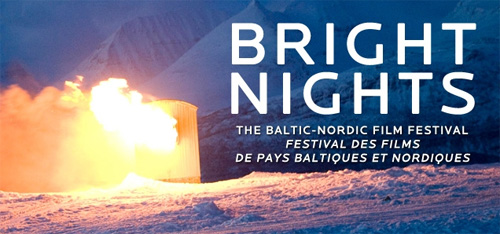
The Canadian cities Montreal and Ottawa are organising the annual Baltic-Nordic film festival Bright Nights during May-June 2011. In collaboration with Baltic and Nordic nations, the Canadian Film institute premiered festival of films from Northern European countries, among them Finland, Sweden, Norway, Iceland, Estonia, Latvia, Denmark and Lithuania.
Lithuania is represented by the movie director Rasa Miskinyte’s The Bug Trainer. The movie depicts a story of one of the giants of animation, Lithuania born Russian-French animator Ladislas Starewitch. A real historical figure, Starewitch (1882-1965) was a pioneer of puppet animation and is arguably one of the world’s forgotten film geniuses, who used insects and other animals as protagonists in his stop-motion pictures. In The Bug Trainer dir. Rasa Miskinyte tries to “decode” Starewitch by exploring his creative process, his eccentric biography and, above all, his remarkable animated films.
Rasa Miskinyte is a well known movie producer in Lithuania; in 2009 she received a Silver Crane - Lithuanian film industry award for best professional job for The Bug Trainer also.
This summer, viewers in Canada also got a chance to approach to a remarkable story of animator Ladislas Starewitch during the Bright Lights film festival.…
- Bookmark :
- Digg
- del.icio.us
- Stumbleupon
- Redit it
The music professor is getting ready for his 17th summer festival!
Wed, 11th May, 2011 - Posted by - (0) Comment
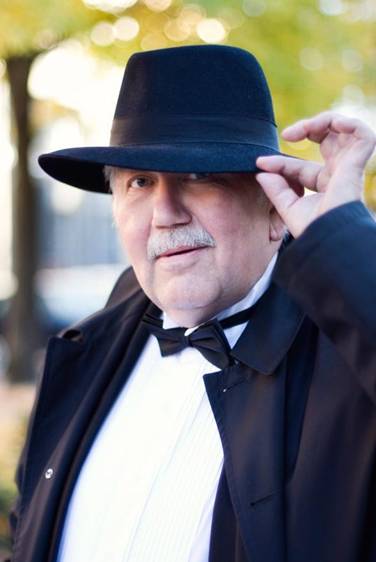
Lithuania’s great Maestro, Professor Donatas Katkus
Photo: Elena Petkauskiene
Donatas Katkus interviewed by Aage Myhre
Here he is, Lithuania’s famous music professor, Maestro Donatas Katkus! The man behind the Christopher Summer Festival since its very beginning in 1995, the man who has spread the joy of music throughout the streets of Vilnius for a whole life, making this city one of the most attractive in the world for all music lovers!
The Christopher Summer Festival is all about music – mostly classical, but also jazz and other genres are featured. The festival takes place in Vilnius churches, courtyards and concert halls, and lasts throughout all the summer, from the 1st of June till the 28th of August, even if the ‘official’ part lasts ‘only’ from 1st of July till the 26th of August! This summer’s festival is the 17th – a fantastic achievement by the founder, leader and artistic director – the utterly famous professor Donatas Katkus – and his excellent team!
The professor is conducting music and music festivals more energetically than anybody else, and he also treats the very term music in an anything but traditional manner, for example when he conducts an acrobatic plane, doing its loops according to Bach’s “Ave Maria”, or when he conducts a complete “orchestra” of bulldozers and excavators.
- Bulldozer conduction is very sexual, says the professor, gesticulating and emphasizing the importance of his words, in his so typical manner - full of humor, intensity and warm enthusiasm.
Donatas Katkus was born in Kaunas 68 years ago, where his mother, an amateur actress, raised him alone. The professor was the outcome of a hectic love affair, and he never met his father.
-But, says the professor, I do not complain, because I am a very young and very nice man, and I am just happy my mother did not take the veil in a Belgian nunnery, as she planned to do before the war started.
- Bookmark :
- Digg
- del.icio.us
- Stumbleupon
- Redit it
Music nonstop since 1995!
Wed, 11th May, 2011 - Posted by - (0) Comment
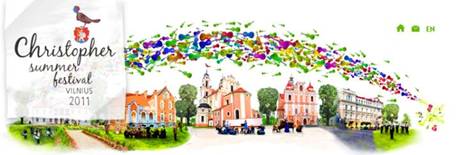
The idea to organise a Vilnius summer music festival was conceived in 1995 after a concert tour abroad by Professor Donatas Katkus, the artistic director of the then recently established St. Christopher Chamber Orchestra. The concept was very simple - back then, the prevailing belief in Lithuania was that no cultural life could exist during summer in the city - only in the resort towns, and this was a belief that demanded to be refuted! The Maestro had seen many successful examples of an unexpectedly large amount of excellent classical music festivals occuring during summer in Western Europe - often in castles beyond the urban fringe, but in the larger cities as well.
- Bookmark :
- Digg
- del.icio.us
- Stumbleupon
- Redit it
This year’s programme
Wed, 11th May, 2011 - Posted by - (0) Comment

The TANGATA QUINTET (Poland)
The official christopher summer festival starts only ON the 1st of july, but in june you can already enjoy this ‘in anticipation of’ concert:
Friday, June 3, 7.30 pm
Vilnius Picture Gallery Courtyard (4 Didžioji St., Vilnius)
AN EVENING WITH TANGATA.
IN ANTICIPATION OF THE CHRISTOPHER SUMMER FESTIVAL...
An event to mark 15 years since the opening of the Polish Institute
Concert organized in cooperation with the POLISH INSTITUTE
TANGATA QUINTET (Poland):
Grzegorz LALEK (violin)
Klaudiusz BARAN (bandoneon)
Piotr MALICKI (guitar)
Hadrian Filip TABĘCKI (piano)
Sebastian WYPYCH (double bass)
Vilnius City Municipality ST. CHRISTOPHER CHAMBER ORCHESTRA
Conductor DONATAS KATKUS
If you believe in the saying “your New Year’s Eve is a preview of the rest of your year”, you should also believe “expect surprises, for summer and the Christopher Festival are here!” That’s precisely why we are inviting you to a real milonga in the heart of the Old Town, where you will see and hear the St. Christopher Chamber Orchestra along with Tangata, a quintet loved by the global tango community. Whatever this collective happens to play – from heart-breakingly familiar romance melodies, and folk songs, to works by the famous A. Piazzolla – every one of them sounds like the most beautiful, most passionate, most Argentinian spirit-filled tango. So, be prepared… to flirt with summer to a tango rhythm!
Programme - J. Peterburski, W. Szpilman, H. Wars, A. Piazzolla
Official Tangata Quintet website http://www.tangata.pl/
Official Polish Institute website http://www.lenkukultura.lt/
Video http://www.youtube.com/watch?v=hPqkrzWUnxg
http://www.youtube.com/watch?v=_tJ1EDaw5bc
Free admission
- Bookmark :
- Digg
- del.icio.us
- Stumbleupon
- Redit it
The ‘Kino Pavasaris’ film festival means that spring is here!
Wed, 2nd February, 2011 - Posted by - (0) Comment
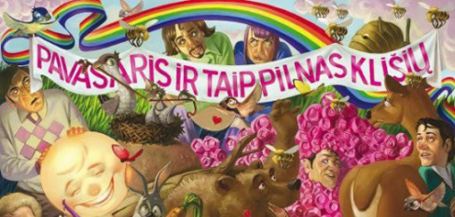
One of the most anticipated events for all cinema lovers who reside in Lithuania – the Kino Pavasaris (Cinema Spring) film festival - for the 16th time proved that spring in Vilnius comes along with the cinema. The theme of the event has been named ‘spectacular and without clichés’ – such a promising way to say goodbye to retiring winter.
This year’s Festival program presented 130 new films from all over the world, including screamers of 2010, which competed for the prestigious Palme d’Or or Golden Bear awards, such as Of Gods and Men, Poetry and Certified Copy, just to name a few. During the latter 2 weeks of March some of them were introduced to Vilnius viewers at the Forum Cinemas, Pasaka and Skalvija movie theatres, located in different parts of Lithuanian capital.
- Bookmark :
- Digg
- del.icio.us
- Stumbleupon
- Redit it
100 years since M.K. Čiurlionis died
Tue, 11th January, 2011 - Posted by - (4) Comment

"Rex" (1909) is one of the most famous paintings of M.K.Čiurlionis (1875-1911), Lithuania's national painter and composer.
www.ciurlionis.eu/
On the 10th of April it is 100 years since Lithuania's national composer and painter, Mikalojus Konstantinas Čiurlionis (1875-1911), died. VilNews will on this occasion respect presents a series of articles about his life and works. We will also have a very personal talk with his great grandson, Rokas Zubovas, who has been following in his great-grandfather's musical footsteps...
- Bookmark :
- Digg
- del.icio.us
- Stumbleupon
- Redit it
Tue, 11th January, 2011 - Posted by - (1) Comment
M. K. Čiurlionis great grandson, Rokas Zubovas:

Music of Čiurlionis makes you grow
“It all started in my childhood, of course. When I was accepted to the music school of “Naujalis” in Kaunas, it was somehow always natural to think that if there’s a need to play Čiurlionis, I as a great-grandson, would the best fit. So I got used to being related with the name of Čiurlionis since my primary classes. I don’t even remember what I used to play but obviously, it was already Čiurlionis. As I remember, even the first big concerts of mine were also shaped by Čiurlionis music. To sum up, it would be almost 35 years.”
“Almost all the time I used to have an internal prejudice that to some extent, I am as an advocate of him. I used to feel that everyone expects me to be the one who has to carry the message about Čiurlionis. That is my mission.”
- Bookmark :
- Digg
- del.icio.us
- Stumbleupon
- Redit it
Meet the wall at Literatų gatvė
Tue, 11th January, 2011 - Posted by - (0) Comment
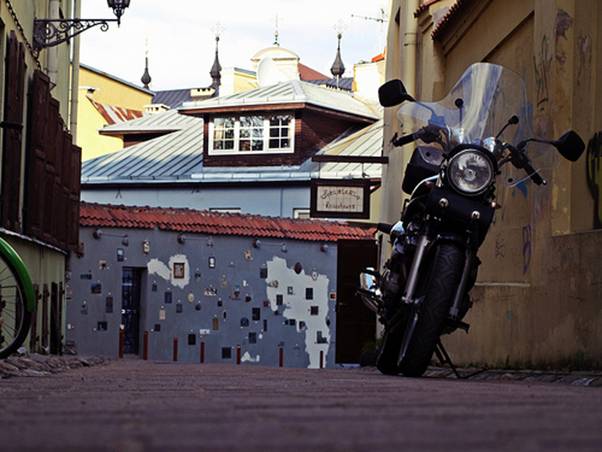
You leave Vilnius Old Town’s main street – Pilies g. – and after only 50 m you meet this wall at Literatu street,
full of artworks dedicated to some of the greatest writers of Lithuanian past and present.
The many artworks mounted on this wall at Literatu street (Literatų gatvė) in Vilnius Old Town is an amazing collection dedicated to outstanding Lithuanian literature personalities - writers, translators – all with links to Lithuania and with some importance for the country’s literature. This project has his own web site www.literatugatve.lt Various weatherproof techniques have been used to make the artworks; some pieces are made of ceramics, others are sculptures made of glass and other materials, whereas some pieces are painted straight on the wall.
- Bookmark :
- Digg
- del.icio.us
- Stumbleupon
- Redit it
The unorthodox music professor
Tue, 11th January, 2011 - Posted by - (0) Comment
Here he is, the professor who is conducting music and music festivals more energetically than anybody else, and who treats the very term music in an anything but traditional manner, for example when he conducts an acrobatic plane, doing its loops according to Bach’s “Ave Maria”, or when he conducts a complete “orchestra” of bulldozers and excavators.
- Bulldozer conduction is very sexual, says the professor, gesticulating and emphasizing the importance of his words, in his so typical manner - full of humour, intensity and warm enthusiasm.
- Bookmark :
- Digg
- del.icio.us
- Stumbleupon
- Redit it
VilNews e-magazine is published in Vilnius, Lithuania. Editor-in-Chief: Mr. Aage Myhre. Inquires to the editors: editor@VilNews.com.
Code of Ethics: See Section 2 – about VilNews. VilNews is not responsible for content on external links/web pages.
HOW TO ADVERTISE IN VILNEWS.
All content is copyrighted © 2011. UAB ‘VilNews’.

 Click on the buttons to open and read each of VilNews' 18 sub-sections
Click on the buttons to open and read each of VilNews' 18 sub-sections 

